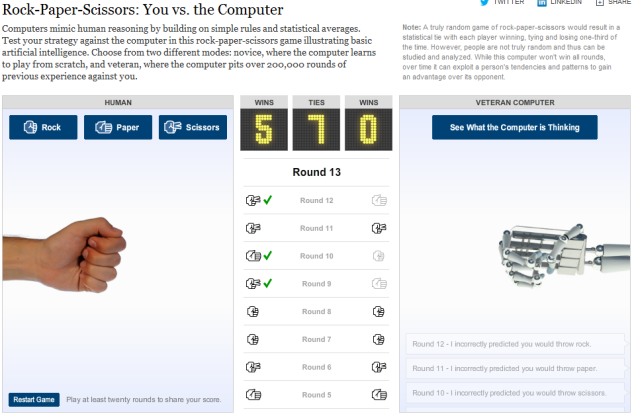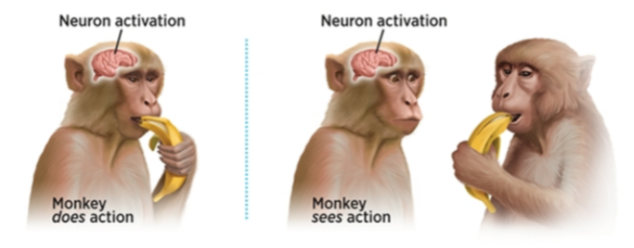What’s the difference between a mind game and blind guessing?
https://en.wikipedia.org/wiki/Mirror_neuron#Understanding_intentions
Mirror Neurons. People have a natural capacity to understand and predict other people. This same capacity does not exist with machines (though one time I beat a rock paper scissors neural net with 5 wins, 7 draws, and 0 losses, presumably because it was acting on data from real people). Machines can be way more perfectly random than people. People are very bad at being random.

https://www.ncbi.nlm.nih.gov/pmc/articles/PMC1044840/ https://www.sciencedaily.com/releases/2015/02/150226132046.htm http://www.fil.ion.ucl.ac.uk/~karl/Predictive%20coding%20an%20account%20of%20the%20mirror%20neuron%20system.pdf
It’s been shown that humans have a limited ability to predict the actions of other humans under observation, believed to be facilitated with Mirror Neurons, Neurons that fire both when you do something, and when you see someone else do something (or even if you think they’re going to do it, but don’t realize you think it yet). When you expect someone to do something, neurons in your head fire, but you don’t have conscious access to these, rather they bubble up into your conscious mind as a prediction.

There are some people who have no ability to predict other people, and just choose what they think the most unlikely thing is, like Mew2king. There are others who get inside the other person’s head, like PPMD, Mango, or Daigo. Fun fact, autism is suspected to be at least partially connected to a deficiency in mirror neurons.
A mind game is about watching people’s responses to situations, then choosing the response that beats theirs in that situation. A mindgame is about conditioning another player to respond a certain way to a situation, then changing it up on them at a critical moment. Repeat conditioning causes people to act pre-emptively and worsens their reaction time for unexpected stimuli.
Mindgaming is about knowing common reactions to certain situations and preying on those or setting up those situations at a critical moment to eke out a win. The thing is, when you’re playing someone else, they’re adapting to you too. So you need to update your log of opponent reactions as they change their pattern or anticipate when they’re going to change their pattern based on what you know about the player’s adaptation speed.
The difference between a read and a reaction is speed. When you read, you act pre-emptively. For this reason, reads are stronger than reactions, because you have more time to get stuff done, but you sacrifice accuracy. When you read, you’re flying blind.
Emukiller was the dude who taught me to react more in Smash. A lot of scenarios have 100% solutions, but only if you react. If you read pre-emptively all the time, then you’re liable to get screwed up when you could have covered all possible outcomes by just reacting. It’s up to you to figure out what the limits of your reaction time are to determine what’s reactable and what’s not.
This combo video is good for emphasizing mindgames. Notice how Darkrain moves preemptively of his opponent’s action. He’s there ahead of his opponent. He knows what they’ll select.
Or this:
Or here’s a Daigo montage for comparison:
And this is probably the most clear example of a mind game you’ll see all day:
(for those wondering what it did, it made Combofiend afraid to act and more defensive, allowing Mike “Mike Ross” Ross to get in and pressure him for the KO)
Try playing someone worse than you and beating them just using basic options. I frequently beat beginners using nothing but light attacks in street fighter, or only sweeps, or only crouching strong. If you know exactly when to throw a move, then unless there’s a pure counter for it, you can win every time, even if it’s a bad or unsuitable move. Knowing when to throw it involves reading. Try this versus a friend who is bad to see what I mean.
One thought on “Mind Games via Mirror Neurons”